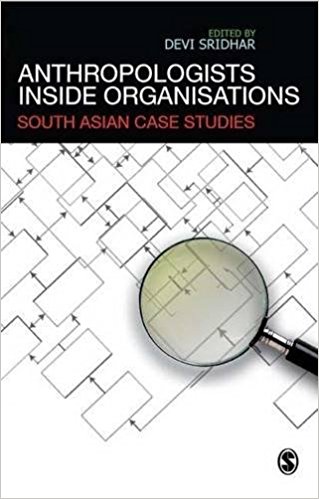Influenced by the works of David Gellner and Eric Hirsch’s Inside Organizations at Work (Oxford, 2001), Cris Shore and Susan Wright’s The Anthropology of Policy: Critical Perspectives on Governance and Power (Routledge, 1997), and Susan Wright’s Anthropology of Organizations (Routledge, 1994), the editorial expedition of Devi Sridhar’s Anthropologists Inside Organizations: South Asian Case Studies, the book under review, explores an anthropological understanding of organizations in South Asia as well as Europe. The dominant objective of the volume is to understand the practices and processes of anthropological research inside and with organizations. Divided into two major sections—health and education—with nine chapters the book broadly comprises seven case studies, which largely highlight the negotiations and interactions of young anthropologists with organizations. Out of these seven case studies that hold the richness of the volume, six case have been undertaken in India, and only one has been carried out in Europe (south England).
Anthropology of organizations or organizational anthropology is one of the recent specialties within the discipline of anthropology. This specialty has emerged in order to address or understand the development of multifarious organizations and their roles in society. In response to this organizational development, anthropologists have gradually developed alternative tools and techniques, (ethnographic fieldwork, for example) to understand the processes and practices inside and within organizations. With this prime premise, Anthropologists Inside Organizations unearths anthropological researches or case studies, which have been undertaken in different sets of organizations starting from faith-based organizations to the non-governmental organizations.
As mentioned earlier, the case studies mainly focus on two aspects i.e. health and education. Out of these seven, five are related to health, and only two are confined to education. The opening case study i.e. ‘Researching based organizations in India’ by Nathan Grills attempts to explore the effect of faith on Indian faith-based organizations with specific reference to HIV. The second study has been conducted by Aravinda Meera Guntupalli to understand the health seeking behaviour of sexually transmitted disease risk groups. Similar to the study of Guntupalli, the case study of Sonali Srivastava on ‘Inside case study methodology: conceptions of STIs and health-seeking behaviour among street-based sex workers in Chittagong, Bangladesh’ demonstrates methods to understand the health-seeking behaviour and comprehension of STIs. Shahid Perwez’s ‘Towards an understanding of the field within the field: researching female infanticide by researching NGOs in Tamil Nadu’ deals with sex-selective abortion in Salem district of Tamil Nadu. In the final case study Devi Sridhar basically attempts to understand the contribution of The World Bank on the health related and nutrition projects in Tamil Nadu. The case study is generally confined to an examination of the Tamil Nadu Integrated Nutrition Project.

